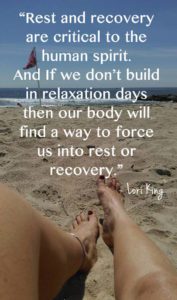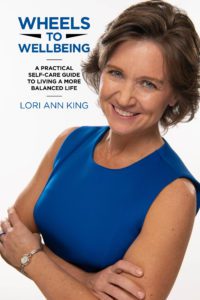Relax!
Why It’s Important to Allow Yourself to Rest, Restore, and Recreate
Let me ask you? How often do you take the time to relax? To truly let go of your work and your worries? To give yourself a break?
Time to get real. During a hot yoga session, I started my Savasana (think total relaxation, body at rest, or corpse pose at the end) about 15 minutes early. My body just said it was time for a much-needed rest, so I focused on deep breathing and relaxed into the pose.
I listened to what my body and mind needed.
I love physical activities. I love to work out. I love being an athlete. I love being strong. And, I can overdo it, adding to my stress levels. This is where I need to pay attention and be intentional with my regular practice of relaxation.
Years ago, a two-hour or two workouts a day did not seem unreasonable. But then throw in an EARLY a.m. class, meeting or event, and suddenly, my body is feeling the effects of stress and I’m not recovering or worse yet, I’m feeling run down, my muscles are sore, or I’m running the risk of injury. My physical health suffers. And my mental health is at risk.
Thankfully, I have a built-in accountability partner with my husband, Jim. He is always timely with that question or comment from love that says, “Are you sure you want/need to do that? Remember you have this, this and this on your plate this week.”
At first, my brain and my ego want to say YES! I can and I do and I want to!
Yet when I take a breath and listen and truly contemplate the question and look at my schedule, I pause. I tune in to my stress levels and pay attention to what I’m feeling.
Rest and recovery are critical to the human spirit. And if we don’t build in relaxation days – then our body will find a way to force us into rest or recovery.
So we either build relaxation into our recovery process as a regular practice, or our body will take us down. We must choose the focused attention of rest and relaxation; otherwise, our physical, emotional, and mental health will suffer. We develop odd symptoms or digestive issues. At the very least, we will experience tense muscles. The effects of stress appear in our bodies as symptoms in one way or another.
I don’t think I’m alone in this. I speak with friends working out or training seven days a week or twice daily and loading the schedule up to the hilt without considering their recovery process. They aren’t paying attention to their stress levels or the cumulative buildup of the physical activities in their week.
 And yet, even the Creator of the Universe took a day off. What makes me think I don’t need to?
And yet, even the Creator of the Universe took a day off. What makes me think I don’t need to?
And I know the benefits that come when I relax. Rest. Restore. Recreate. I end up smiling more. Laughing more. Creating more.
I am still learning to take care of myself. I encourage you to take care of yourself.
Benefits of Learning to Relax
“Studies show relaxation techniques like meditation can lessen pain from conditions like fibromyalgia, migraine, chronic pelvic pain, and irritable bowel syndrome (IBS). 8/12 Stress hormones can make your blood sugar rise.”
Source: webmd.com
How to Recognize Your Need to Relax.
When you pay attention and develop an awareness, tense muscles may be the first indicator you need to relax.
Insomnia can be another indicator. This is either the struggle to fall to sleep or stay in deep sleep.
Inventory your calendar, energy levels, and things that cause you stress. When we pay attention to our body and emotions, we can get to the root of what needs changing and build more time to rest and relax.
How to Relax. Here are a few tips to build a relaxation practice.
- Learn to say no, even to yourself.
- Schedule a full recovery day every week.
- Spend more time in nature. This alone can be a type of meditation. According to healthpartners.com, “Being outside during the day helps reinforce your body’s circadian rhythm or your sleep and wake cycle.”Source: healthpartners.com
- Sleep more (I am in a period of time where I aim for 8+ hours of sleep per night!)
- From time to time, block off time in your schedule for nothing. Or set time to read a book (not the self-help or personal development kind).
- Take a nap with your kids. Or your luvvies. Are you gathering yet how powerful sleep is?
- Skip the multi-tasking and focus on one thing. (Grand Canyon University says, “The human brain is not wired to perform two tasks at once.”
- Take a break from electronic devices, video games, and social media. Sleep.com says avoiding blue light an hour before bed can drastically improve your sleep. (My “do not disturb” is scheduled for 12 hours at night!)
- Do more deep breathing. (So many of us get in the habit of shallow breathing. Pause and take a deep breath for an instant reset throughout the day. This is another great type of meditation to try.)
- Get a full body massage. It does the body and the mind some good! Not to mention what it does to relieve tense muscles.
- Play more. Recreation can help you relax and restore. It may even help you rest or sleep better.
- Consider giving up caffeine for a period of time. It can allow your body, mind, and adrenals to repair.
- Have you ever tried meditation? It can be as simple as sitting still, in silence for 5 minutes. Meditation can also be done walking, or gardening – anything where you lose track of time and can say present. Meditation can work wonders at lowering your stress levels and helping you sleep.
Take care of you.
#SelfCareAwareness
If you found this article helpful and want to say thanks, click here to buy Lori King a coffee.

Additional Reading:
From my blog:
From my bookstore:
Wheels to Wellbeing is all about learning YOUR BEST options for self-care.
It will help you examine the spokes on YOUR wellness wheel. It’s Life Lessons from a Highly Sensitive Introvert.




